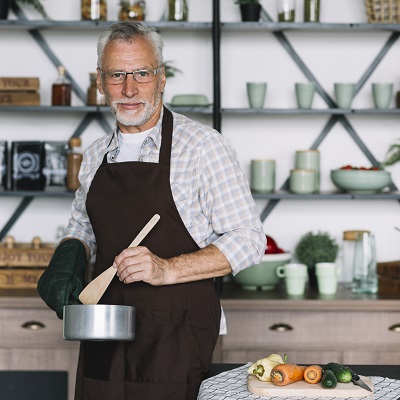 The concept of the home-cooked meal seems to be disappearing. Americans spend half their household food budget on meals eaten outside the home.
The concept of the home-cooked meal seems to be disappearing. Americans spend half their household food budget on meals eaten outside the home.
However, only a small portion of those meals (about 20%) meet the nutritional guidelines set by the US Department of Agriculture.
This is according to a study by the University of Washington published in the American Journal of Preventive Medicine in March 2017.
According to the study, people who ate out often were more likely to eat unhealthily, consuming more fat, alcohol and added sugar.
On the other hand, people eating at home consumed less fat, alcohol and added sugar, while eating more vegetables and fruit.
Here’s why learning to cook will benefit your health:
1 – Control
Cooking your food at home gives you control over what goes on your plate, nutritionist Lona Sandon tells WebMD. And, therefore, we eat healthy.
University of Washington study seems to back this up. Adam Drewnowski, the author of the study, pointed out that frequent eating out was associated with ”lower diet quality, more ’empty calories’ and higher diet costs” compared to home cooking.
Dietitian Ben Atkinson concurs, telling the University of Washington website The Whole U: “When we cook at home, we are in control.”
Atkinson cites the ingredient list for fries sold by fast-food outlets. Fast-food fries have 19 ingredients, but you could make them at home with far fewer. Atkinson suggests tossing potato wedges with salt and pepper, olive oil and cayenne pepper and baking them in the oven. This way you can limit the amount of sodium and fat.
According to WebMD, we’re more apt to eat too much, too fast when we don’t watch what goes into our mouths. How can we make sure our meals are healthy and low-calorie if we don’t know how they were prepared?
If you knew how much butter and sugar went into baking cookies you are much less likely to go on a cookie binge.
2 – Food Allergies
The Whole of U points out that if a family member has a food allergy, cooking at home means you can reduce the risk of an allergic reaction.
3 – Keeping it Together
The Whole of U says that when a family eats together, the children and adults are much healthier. “Eating together is linked to less obesity, kids doing better in school, and less substance abuse within the family,” it says. Also involving children in food preparation sets them up for life in terms of making healthy food choices.
4 – Portion Control
Sometimes the portions served up by restaurants and fast-food joints are big enough to feed two people. And, says the University of Washington, when the food’s in front of you, you are much more likely to eat it all, and pile on the pounds. When you prepare the food yourself, you have much more control over portion sizes, and you can regulate the amount of food served.
5 – The Food Connection
According to WebMD, cooking your own food helps you to tune into how real food tastes and smells. And the whole process of eating begins to mean something. Eating becomes more about conscious nourishment and will lead to less unconscious overeating.
You’re also more motivated to slow down and really enjoy a meal after working hard to make it.






